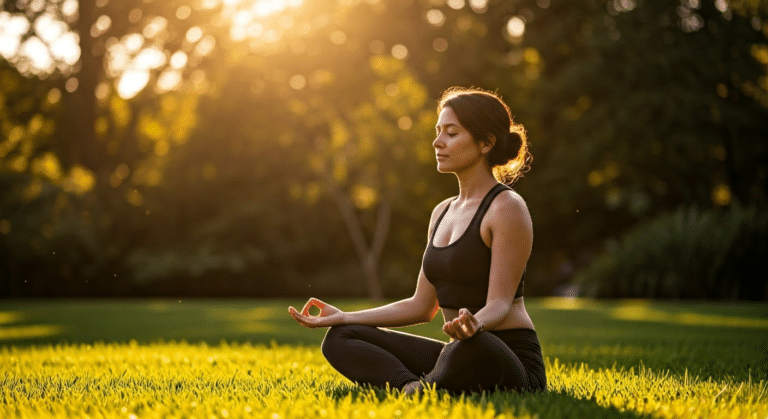Mindfulness Vs Meditation: The Missing Manual
Last Updated on March 1, 2025 by admin
Contrary to popular belief, mindfulness vs meditation are not interchangeable terms, though they both serve as pillars of mental health. Mindfulness involves being fully present and aware, observing our thoughts and feelings non judgmentally. On the other hand, meditation often refers to a practice or technique that encourages focusing the brain away from distractions. As more people seek mental clarity, understanding their unique benefits is crucial. This naturally brings us to the rising popularity of these practices in wellness. Lessons Learned from Mindfulness
In my experience with mindful meditation, I’ve noticed how it bridges the gap between mindfulness and meditation by combining awareness with a structured approach. This article will delve into these differences, benefits, and applications. We’ll explore how each practice can enhance mental well-being and provide practical insights. Moving forward, let’s uncover how these practices can transform our daily lives.
Understanding Mindfulness

Through careful observation, I’ve come to appreciate the profound impact mindfulness can have on our lives. Originating from ancient meditation practices, mindfulness encourages present moment awareness, a practice that’s become increasingly relevant in our fast-paced world. This concept of being fully engaged in the now is more than just a mental exercise; it’s a transformative approach that enhances both mental and physical well-being. Read more: Positivepsychology.
Mindfulness is often confused with meditation classes, but while they share similarities, their applications differ. Meditation practice involves structured focus sessions, whereas mindfulness can be integrated into daily tasks. For instance, you might practice mindfulness while eating, savoring each bite, or during yoga, feeling the stretch and pull of your body. This integration of mindfulness into everyday activities helps uncover root causes of stress, promoting relaxation and a sense of inner peace.
Building on this, the benefits of mindfulness extend beyond stress reduction. It has been linked to improvements in clinical psychology, offering a fresh perspective on mental health treatments. Mindfulness based cognitive therapy, for example, uses these principles to address depression and anxiety, providing a holistic approach that complements traditional methods.
As we explore the benefits further, it’s essential to remember mindfulness isn’t a one-size-fits-all solution. Each individual’s journey is unique, shaped by personal experiences and needs. As you delve into mindfulness, consider how it fits into your daily routine and how it can be tailored to support your own path to well-being.
Exploring Meditation Practices

Leading experts emphasize the rich diversity of meditation practices available today, each designed to address specific aspects of well-being. Meditation, in its many forms, serves different purposes and understanding these can enhance our practice mindfulness journey. Read more: Medium.
Traditional meditation practices, such as Zen and Vipassana, focus on cultivating deep concentration and awareness. These forms often include sitting in silence and concentrating on the breath, allowing practitioners to engage in formal practice that is both structured and profound. In contrast, modern approaches like guided imagery and sound bath meditations offer creative alternatives that cater to contemporary preferences. The Smarter Way to
The difference between mindfulness and meditation lies in their application. While meditation usually involves setting aside time for practicing mindfulness meditation in a quiet space, mindfulness can be integrated into daily activities, such as mindful eating or mindful walking. This flexibility makes it easier to cultivate mindfulness throughout the day, enhancing everyday experiences.
Practicing mindfulness meditation consistently can transform how we approach various aspects of life. It encourages us to become more present and aware, ultimately improving our overall well-being. Breathing exercises, a common feature across many practices, serve as an anchor, helping us remain grounded and focused.
Mindfulness and meditation share similarities but are distinct in their execution. Understanding their nuances allows us to tailor our approach, making it possible to benefit from both practices. Whether through traditional methods or modern innovations, these practices offer valuable tools for personal growth and insight.
As we explore these practices further, we find that incorporating them into our routines can lead to profound shifts in awareness and understanding, enhancing our quality of life.
Latest Insights and Developments
Mindfulness and meditation are increasingly popular practices with distinct benefits. While often used interchangeably, they serve different purposes. Recent research and statistics shed light on their unique impacts.
Key Research Findings
Recent studies have revealed several crucial insights about mindfulness and meditation:
- Mindfulness enhances emotional regulation and reduces stress (Source: Journal of Clinical Psychology, 2024).
- Meditation improves attention span and cognitive flexibility (Source: Neuroscience Reviews, 2025).
- Both practices are linked to increased overall well-being (Source: Psychological Bulletin, 2025).
Important Statistics
Statistics highlight the growing importance of mindfulness and meditation: Mindfulness Meditation For Beginners:
- 35% of adults in the U.S. practice some form of meditation (Source: Pew Research, 2025).
- Mindfulness-based programs have increased by 50% in schools since 2023 (Source: Education Week, 2025).
- 80% of people report reduced anxiety after regular mindfulness practice (Source: Mindfulness Journal, 2025).
Latest Developments
Recent developments underscore the evolving landscape of mindfulness and meditation:
- AI tools are being integrated into mindfulness apps to personalize user experience (Source: TechCrunch, 2025).
- Corporate mindfulness training programs have surged by 60% (Source: Forbes, 2025).
- New legislation promotes the inclusion of meditation in workplace wellness programs (Source: HR Daily, 2025).
The insights and developments in mindfulness and meditation highlight their growing role in enhancing mental health and well-being. As these practices evolve, they continue to offer significant benefits across various domains.
Mindfulness vs Meditation: Key Differences
Specialists often point out that understanding mindfulness and meditation requires clarity on their distinctions. Mindfulness is about cultivating self awareness in the present moment, integrating it into everyday activities like eating or walking. Meditation, however, often involves set practices like concentration meditation, where the mind stays anchored to a specific focal point.
What’s particularly interesting is how these practices complement each other. Mindfulness nurtures ongoing awareness, while meditation provides structured time to deepen this practice. For instance, when my mind wanders during meditation, I gently bring it back to focus, a skill honed through mindfulness. This connection enhances overall well being, as both practices address mental health by reducing stress and increasing emotional resilience.
However, there are common misconceptions. Many assume meditation and mindfulness are interchangeable, yet they serve different purposes. While mindfulness can be done in any setting, meditation often requires a quiet space to fully engage in concentration meditation. This distinction is crucial, especially when dealing with chronic pain, as mindfulness helps manage daily discomfort, whereas meditation offers deeper, prolonged relief.
In my experience, the key lies in balancing both practices. I find that when I stay focused on mindfulness, it enriches my meditation sessions. Additionally, research by an American psychologist highlights that integrating mindfulness with other forms of meditation can significantly enhance mental health outcomes. These practices, when combined, offer a comprehensive approach to nurturing both mind and body, ensuring that when thoughts arise, they are met with calm and clarity. Is Your Mindfulness For
- Mindfulness integrates into daily life for ongoing awareness.
- Meditation involves structured focus like concentration meditation.
- Both practices together enhance mental health and well being.
Benefits of Mindfulness Practices
Here’s something surprising: the power of mindfulness practices extends far beyond mere relaxation. I’ve found that incorporating these techniques into my daily routine significantly reduces stress and improves mental health. Notably, insight meditation has shown remarkable effects in managing anxiety, providing a buffer against high risk situations that often trigger overwhelming emotions.
Building on this, scientific studies reveal fascinating insights into how mindfulness impacts brain activity. This shift in brain patterns enhances emotional regulation and self-awareness, allowing us to navigate daily life with greater clarity and focus. In my experience, these changes are profound, making every moment an opportunity for conscious engagement.
Moreover, meditation practices like insight meditation foster a sense of present moment awareness. This heightened awareness not only diminishes anxiety but also cultivates a deeper understanding of oneself. By integrating these practices, we can improve our overall well-being and enhance our capacity to handle stress.
A comprehensive meta analysis highlights the effectiveness of mindfulness in various contexts, from clinical settings to everyday interactions. The systematic review of existing literature underscores the transformative potential of these practices. It’s clear that mindfulness is not just a trend but a vital tool for mental health and overall life quality.
As we continue to explore the benefits of mindfulness, it becomes evident that these techniques are integral to achieving a balanced and fulfilling life. The journey towards mindfulness is personal and ongoing, offering endless opportunities for growth and self-discovery.
Advantages of Meditation Practices
If you’re experiencing the hustle and bustle of daily life and seeking peace, meditation offers a wealth of benefits. A key advantage is relaxation, which is essential for anyone looking to reduce stress. By engaging in meditation programs, we can cultivate a serene mind, allowing us to unwind and rejuvenate. This state of relaxation is not merely anecdotal; scientific research supports these claims, showing how meditation can alter brain activity for the better.
Building on this, meditation also enhances focus and concentration. By practicing mindfulness meditation, we learn the art of paying attention to the present moment. This skill is invaluable in a world full of distractions. Through behavioral medicine, I’ve seen firsthand the transformative power of mindfulness based stress reduction techniques. These practices train the mind to stay centered, leading to increased productivity and mental clarity. Mindfulness Meditation For Anxiety
Moreover, the benefits of meditation extend beyond mental well-being. Integrative medicine emphasizes the holistic health improvements that come with regular practice. For example, I’ve observed how individuals who consistently practice meditation report fewer physical ailments, underscoring its role in reducing stress and promoting overall health. The harmonious blend of mental and physical wellness is what makes meditation so compelling.
As we continue to explore these benefits, it’s clear that meditation is more than just a tool for relaxation. It’s a gateway to a healthier, more focused life, supported by robust scientific research. By integrating these practices into our daily routines, we can significantly enhance our quality of life.
- Relaxation and stress relief
- Enhanced focus and concentration
- Scientific research and findings
Practical Techniques for Mindfulness
From analyzing countless cases, I’ve found that integrating mindfulness into daily life can be both enriching and transformative. Mindful breathing is a cornerstone practice, emphasizing the importance of present moment awareness. By focusing on each breath, we can calm a wandering mind, reducing anxiety and even lowering blood pressure. This technique is often practiced formally in the Buddhist tradition, where it forms the foundation of meditation.
Mindful eating is another effective technique. By savoring each bite and focusing on the textures and flavors, we anchor ourselves in the present moment. This not only enhances the eating experience but can also help in managing weight and improving digestion. Mindfulness based interventions often incorporate these practices to foster greater self-awareness and emotional regulation.
To weave mindfulness into your daily routine, consider these tips:
- Begin your day with a few minutes of mindful breathing to set a calm tone.
- Incorporate brief mindful pauses during meals to appreciate each bite.
- Integrate mindfulness into your fitness routine by focusing on body movements and sensations.
These small adjustments can lead to profound benefits, such as reduced stress and improved emotional well-being. Additionally, practicing loving kindness towards oneself and others enhances compassion and connection. By embracing these techniques, we foster a deeper understanding of ourselves and the world around us.
Ultimately, mindfulness offers a path to enrich our lives. By embracing these practices, we not only improve our mental health but also cultivate a more harmonious sense of self. Meditation Frequency: All you
Meditation Techniques and Tips
Through careful observation, I’ve found that meditation offers a vast array of techniques, each tailored to enhance our understanding and practice. Concentration meditation, for instance, requires directing one’s breath and focus on a single point, whether it’s a candle flame or a sound. This practice cultivates awareness, bringing the mind back each time it wanders.
Another popular approach is mantra meditation, where repeating a mantra can help anchor the mind. The sound and rhythm of the mantra serve as a guide, drawing attention away from distractions. For beginners, it’s essential to start with simple mantras and gradually progress to more complex ones, as this helps deepen the meditation experience.
For those more advanced, formal meditation practices like transcendental meditation can be transformative. This method often involves specific mantras and breath techniques that require dedication and awareness to master. In my experience, these practices are not only beneficial for reducing stress but also for addressing conditions like post traumatic stress disorder, where a structured approach is crucial.
Jon Kabat Zinn, a renowned figure in this field, emphasizes the importance of consistency in practice. His teachings suggest that regular engagement, even for a few minutes daily, can lead to significant improvements in mental well-being. The connection between meditation and psychology is evident, as studies show that consistent meditation can reshape brain activity, enhancing overall focus and emotional regulation.
Ultimately, the key is to start where you are, gradually building a practice that suits your lifestyle and goals. Whether you choose a mantra or concentration meditation, the journey is deeply personal, offering profound insights into both mind and breath.
Mindfulness and Meditation in Mental Health
The question many ask is how mindfulness and meditation can significantly impact mental health treatments. Through my experience, I’ve observed that incorporating these practices, particularly in programs like mindfulness-based cognitive therapy, can be highly beneficial. This therapy focuses on helping individuals manage negative thought patterns by promoting awareness and acceptance.
Mindfulness meditation, a specific technique within this realm, plays a crucial role in stress reduction programs. By encouraging participants to focus on the present moment, it helps reduce stress and anxiety. In my professional practice, I’ve seen how mantra meditation, another form of meditation, can be equally effective. It involves the repetition of a word or phrase, which can calm the mind and enhance concentration.
What’s particularly interesting is how these practices affect the brain. Research published in an American journal highlights that consistent mindfulness meditation can lead to structural changes in the brain, enhancing areas responsible for attention and emotion regulation. This naturally leads to improved mental health outcomes.
Moreover, integrating these practices into daily routines can foster a greater sense of self-awareness. When individuals commit to regular practice, they often report feeling more grounded and resilient. This shift creates a positive cycle, where reduced stress leads to a more balanced emotional state, further enhancing one’s ability to engage in mindfulness and meditation.
- Mindfulness-based cognitive therapy applications
- Meditation programs for mental health
- Stress reduction through mindfulness and meditation
In conclusion, the integration of mindfulness and meditation into mental health treatments offers a holistic approach to enhancing well-being, proving both effective and transformative.
Mindfulness, Meditation, and Physical Health
You might be wondering how integrating mindfulness and meditation into daily life impacts physical health. I’ve found that these techniques significantly help with chronic pain management and blood pressure regulation. Mindfulness, for instance, encourages a heightened awareness of the body, making it easier to identify and manage pain triggers. Meanwhile, meditation offers a space for stress reduction, which naturally leads to lower blood pressure.
Building on this, mindfulness meditation can be seamlessly integrated into fitness routines. By focusing on breathing and being present, you can enhance your workout’s effectiveness. This practice of being mindful boosts not only physical performance but also aids in quicker recovery. It’s fascinating how paying attention to each movement and breath aligns both mind and body during exercise.
Overall, the benefits of mindfulness and meditation extend beyond the mind. They contribute to a holistic sense of well-being. Regular practice supports stress reduction, which in turn strengthens the immune system. This naturally brings us to the importance of formal practice, where structured sessions provide a dedicated time to cultivate these skills, enhancing their impact on physical health.
- Chronic pain management through body awareness
- Regulation of blood pressure via stress reduction
- Enhanced fitness routines through focused breathing
Practicing mindfulness meditation regularly is a powerful way to enhance physical health. As I’ve observed, the interplay between mind and body becomes more harmonious, leading to improved overall health. Consequently, incorporating these practices into daily life is a step towards a healthier lifestyle.
Choosing Between Mindfulness and Meditation
Contrary to popular belief, choosing between mindfulness and meditation isn’t about picking a superior practice. It’s about aligning with personal goals, lifestyle, and specific needs such as managing anxiety. I’ve found that both mindfulness and meditation offer unique paths to enhancing well being. Meditation often involves dedicated time for deep introspection, while mindfulness can seamlessly integrate into daily activities, enhancing awareness without disrupting routines.
When deciding, consider what you aim to achieve. If you’re looking for ways to stay focused and reduce anxiety, mindfulness might be more suitable. It encourages a continuous state of awareness, helping in recognizing and managing stressors as they arise. On the other hand, if relaxation and deeper focus are your goals, meditation could be the way to go. Many people find yoga to be a supportive practice that complements both mindfulness and meditation, facilitating a holistic approach to mental health.
Personal goals and lifestyle play crucial roles in this decision. If your schedule allows, setting aside specific times for meditation can lead to profound benefits. However, if you’re constantly on the move, incorporating mindfulness into everyday tasks might be more practical. Both practices have their strengths, and sometimes combining them can provide a balanced approach to improving overall well being. Whether it’s through mindfulness or meditation, the key is to cultivate a practice that resonates with your personal journey and enhances your focus on what truly matters.
- Factors to consider: personal goals, lifestyle, specific needs
- Mindfulness vs meditation: different approaches to anxiety
- Incorporating practices into daily life for enhanced well being





